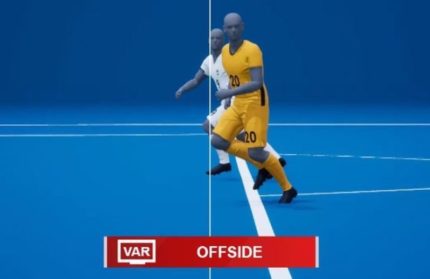The much-anticipated Semi-Automated Offside Technology (SAOT) will not be implemented in the Premier League until 2025, club executives were informed. Originally slated for use in mid-October 2024, the technology has faced delays due to the need for further testing. Although SAOT has been successfully deployed in international competitions such as the 2022 World Cup and UEFA’s Euro 2024, the Premier League has yet to introduce the system.
The initial timeline for its implementation had sparked excitement, particularly as the technology promised faster and more accurate offside decisions. Premier League clubs were told that the system could reduce the time required for close offside calls by over 30 seconds, significantly speeding up match flow. Despite the positive outlook, Premier League officials now believe that the earliest realistic start for SAOT is 2025.
Reasons Behind the Delay: Ensuring Accuracy in a Competitive League
The delay in introducing SAOT in the Premier League has been attributed to the need for additional testing. During a shareholders’ meeting in London, Premier League chief football officer Tony Scholes highlighted the complexities involved in adapting the technology for England’s top-flight competition. According to Scholes, the Premier League’s high-stakes, fast-paced environment necessitates more rigorous tests to ensure the system can handle the demands of each match.
While the technology has already been used in other major football tournaments, ensuring its flawless operation in the Premier League is crucial. Clubs were reassured that, despite the postponement, Video Assistant Referee (VAR) technology has improved in efficiency, with quicker decision-making processes being noted over the course of the 2023-24 season. Nonetheless, SAOT’s delay continues to perplex fans and club representatives alike, as the desire for smoother and more reliable refereeing decisions remains strong.
Positive Developments in VAR Amid the Waiting Game
As Premier League clubs come to terms with the delay, there has been recognition that VAR, the predecessor to SAOT, has improved. Tony Scholes emphasized that VAR’s efficiency has increased, and the process of decision-making has become more streamlined in recent months. This progress serves as a temporary buffer for the frustration surrounding the delay of SAOT, as clubs hope for even more refined decisions when the new technology finally arrives.
Clubs have also been reminded of their role in maintaining the integrity of the game, particularly when it comes to managing player behavior. Several recent matches have been marred by excessive yellow cards, prompting Premier League officials to urge clubs to take a stronger stance on discipline. Though the introduction of SAOT will eventually enhance officiating, club managers and players must continue to uphold fair play on the pitch.
Financial and Legal Concerns Dominate Premier League Shareholders’ Meeting
Beyond the discussions around SAOT, financial and legal issues also loomed large during the shareholders’ meeting. Notably absent from the agenda was any direct mention of the 115 charges currently pending against Manchester City for alleged financial misconduct. The lack of discussion on this matter underscores the ongoing legal complexity of the case.
In a related matter, the Premier League’s mounting legal costs were revealed, with the league spending £45 million on enforcing financial regulations across various cases. Although these figures raised some eyebrows, no official opposition was voiced by club representatives. The financial strain, coupled with the delay in technological advancements like SAOT, signals the Premier League’s commitment to maintaining its competitive edge, even as it faces logistical hurdles in both the sporting and legal arenas.
Manchester City Charges and Financial Concerns Remain Under the Radar
Interestingly, Thursday’s meeting did not cover the 115 financial misconduct charges levied against Manchester City, despite being a significant topic of interest in football circles. Many had expected discussions surrounding the ongoing investigation, particularly after reports revealed that the Premier League has spent £45 million in legal fees to enforce its financial regulations.
While the Manchester City case continues to loom large, the absence of dialogue around it at the shareholder meeting suggests that the Premier League may be attempting to distance itself from the controversy for now. However, with growing scrutiny over how the league enforces financial rules, this issue is unlikely to remain under the radar for long, especially as legal costs continue to mount. The focus, for now, remains on delivering technological improvements and maintaining control over player conduct on the pitch.














